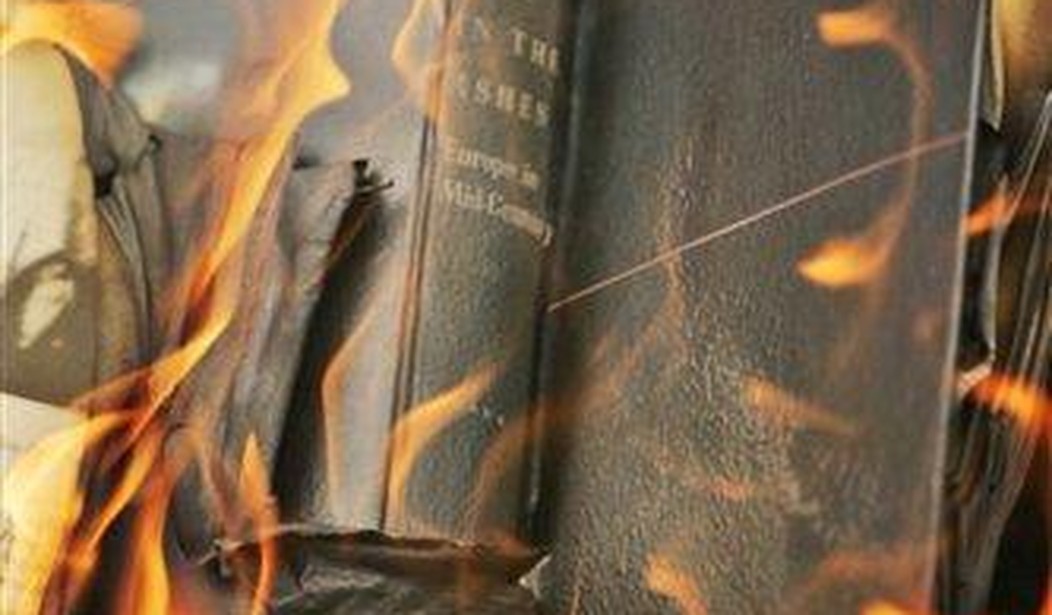Book burning has now come to America. It is book burning in a new form. I would call it stealth book burning. But in some ways, it's even more insidious than the public ritual of book burning.
Book burning is symbolized in a very gruesome way by the infamous Nazi book burning. This was in May of 1933. It was organized by Joseph Goebbels. It occurred on several campuses around Germany. And we recreated the scene in my movie "Death of a Nation."
The book burning is part of a larger thing. First of all, the book burnings occurred in 34 different towns in Germany. It wasn't a single place. After the book burning, a lot of these Nazi youth would go to publishers. They would go to warehouses. They would call for books to be removed, ban libraries. And the idea here was to "clean up Germany," to remove the contamination of dangerous books. And what were these dangerous books? Very often they were books by other German writers, Heinrich Heine, Bertolt Brecht; people like this were targeted for their books to be eradicated and literally set to the flames.
Now, this has become a symbol of intolerance, of Nazi hatred. And I think in America, by and large, the book burning is a stealth book burning, although there was a book burning of some Bibles that occurred in the aftermath of the Black Lives Matter protests. The stealth book burning today is Amazon, for example, not featuring books to sell. Publishers withdrawing books from publication. Professors not assigning books in class. The removal of books from circulation, making them difficult to obtain. People being suppressed on social media for their ideas.
And then, in some ways, there is self-censorship. I noticed this because my wife and I have this discussion, typically when thinking about the podcast. She'll say, "Well, you know, if you talk about this, you run the risk of being kicked off YouTube. If you do this, Facebook could demonetize you or ban you or flag you." And it is amazing that we know we're talking here, not about me reciting epithets or denouncing some ethnic group—none of that–we're talking about legitimate debates in the mainstream of American politics, having to do with the most current issues of the day.
Recommended
My friend Joe Pags, a radio host, was thrown off Twitter. Thrown off Twitter for what? For #hydroxychloroquineworks. Can you imagine?
And now, of course, there are multiple studies showing that hydroxychloroquine does help, but at the time, this was taboo. This was "misinformation." Think of who makes these decisions. Who decides what's misinformation?
Salem sponsors my podcast, and I have these co-hosts, people like Eric Metaxas, Sebastian Gorka. Pags, of course, is not on Salem, but he's also in the radio world. All of these guys have been dinged for this and zinged for that.
And now there's Abigail Shrier, a writer who has written a book about the trans phenomenon. Interestingly, she's not against trans adults. But she noticed something very strange, which is that there is a huge increase or an almost preposterous increase in young people, young children, particularly teenage girls, identifying as trans.
In Great Britain, for example, the number of teenage girls identifying as trans is up 4,400%. And so naturally, this is kind of a remarkable phenomenon. If being trans is something that has always been around, why the surge now? What's going on?
And basically, Abigail Shrier finds out that what's going on is that there is this kind of cultural pressure. There is a kind of abdication by the medical community. You have these young girls who are lonely. They're confused. And so when they go to seek help, they say, "Well, you know, I'm wondering about my sexuality. I sometimes wonder if I'm too much like a boy." Right away, the medical professionals say, "Oh, we have to affirm you and your new identity. We have to start giving you testosterone shots." And so you have this abuse of the medical practice.
In any event, whatever you think of all this, this is a book discussing all of this and discussing it in an intelligent way. And so what happens? Target pulled the book. You can't buy it there. And not only that, but the American Civil Liberties Union (ACLU), an organization established to defend civil liberties, sides with the book burners. One of the ACLU lawyers, unbelievably, is quoted as saying that stopping this book is a hill that he's willing to die on.
All kinds of people write Abigail Shrier and say, "Your book is really good, but we can say that publicly." So these are medical professionals. These are people in the media. And Abigail Shrier rightly says that what you have here is an atmosphere of fear. And people are reluctant to come to your defense.
There was a demonstration in Canada where an LBGTQ group said that they were going to dissociate themselves from a public library because this book was damaging to trans people. To them, to even discuss the topic in this way is damaging. And so Halifax Pride, the annual LGBTQ festival, said it was going to cut ties with the library system. The library, of course, tried to negotiate with them (this is basically how libraries get into the book burning business). The library system said, listen, why don't we direct everyone who asks for this book to a list of "trans-affirming resources"? But these guys said, "No, that's not going to do it. We're not satisfied. We want this book out."
So, in a library of 1.2 million volumes, this book and one other book were targeted. They just could not even be included. And interestingly, in Canada, the Nova Scotia Library Association and the Canadian Library Association were dead silent. You would think that they would step in for free speech. But no, ironically, this great important value of free speech developed in Western Civilization that's been a great engine of open inquiry, not just in the public square for politics, but for scholarly investigation, for advancement in the sciences, for advancements in the law, because of course, the legal system depends on discovery, depends upon a kind of open-mindedness, but it's being shut down all over the place.
This is the new form of book burning – essentially, it's the fear that you will be thrown off social media, partly it's the fear you'll lose your job. But it's also, Abigail Shrier says, the fear of ostracism. Ostracism is a very powerful force in society. It's the fear that you will be "excommunicated" from society. You'll be treated as a pariah.
The ancient Greeks actually had this sort of policy of ostracizing people, banishing them from society. Some people thought it was so awful, that they would prefer death to ostracism because being cut off from a community, to be cut off from the society that is yours and that you value, is in a sense to face a certain kind of social death or social extinction. As Aristotle says, man is a social animal.
The Nazis understood book burning, and they had this public Liturgy of book burning. In America, book burning takes a different form, a quieter form. Don't burn the book. You don't have to burn the book. The book isn't even available for sale. No one's gonna see it anyway. This may not be called book burning, but it's book burning all the same.

























